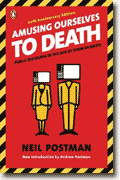Amusing Ourselves to Death
Neil Postman
book reviews:
· general fiction
· chick lit/romance
· sci-fi/fantasy
· graphic novels
· nonfiction
· audio books
· author interviews
· children's books @
curledupkids.com
· DVD reviews @
curledupdvd.com
newsletter
win books
buy online
links
home
for authors
& publishers
for reviewers

 |
Amusing Ourselves to Death: Public Discourse in the Age of Show Business Neil Postman Penguin Paperback 208 pages December 2005 |
|
Neil Postmanís Amusing Ourselves To Death examines the effect of television on American society, with two main conclusions. The first, that television has changed the way Americans think and react to events, is persuasive and well argued. Postman presents a wide array of evidence, anecdotal and statistical, to show that information from television is processed in different ways from information presented in text --what he names ďthe typographic mindĒ--and personal conversations. This leads naturally to the second and central point of Postmanís argument, that the changes in public behavior spurred by television have been detrimental to American society. Unfortunately, this, the bookís central thesis, is less than persuasive.
And this is perhaps the greatest weakness of Amusing Ourselves To Death. Postman provides little in the way of real-world evidence that television has damaged Americaís body politic. Such evidence arguably exists, but it is not examined. Instead, there are anecdotes about televised debates resulting in cosmetically powered elections, and largely philosophical arguments about whether television redefines religion. Postman presents all of this in an alarming tone, insisting that the Show Business age has led to growing political apathy and information overload, and a less empowered public. But anyone choosing to utilize one of the virtues Postman attributes to books might well pause to consider the place of television in social movements of the late twentieth century. The contribution of television to such definitely citizen-driven changes as the Civil Rights movement, the Vietnam and Iraq protests, the environmental movement, and even the end of the Cold War deserve discussion in any examination of media and politics. Paeans to the citizen-wide empowerment of the typographic, pre-television age praise the attention span of Civil War audiences, glossing over the actual fact of the Civil War, both World Wars, slavery, Jim Crow, and most of Americaís more famous social atrocities. It would be erroneous to assign sole responsibility for any of these social events to the dominant form of media, but Postman fails to discuss these issues at all. In ignoring the relationship between media and the defining social events of its day, Postmanís arguments for media influence seem both irrelevant and naÔve. Despite these limitations, Amusing Ourselves To Death is a compelling, and useful, text. It contributes a useful vocabulary for discussing changes in information technology. Now some twenty-plus years out of date, many of the studies and predictions Postman relies on have been challenged or disproved altogether, and such recent developments in communications as the rise of the internet make the idea of a television/textbook binary argument archaic. But in examining the form and content of televised news, and questioning the acceptance of any media, Amusing Ourselves To Death makes itself an essential tool for an informed audience. Originally published on Curled Up With A Good Book at www.curledup.com. © Sarah Meador, 2006 |
|
|
|
 Click here to learn more about this month's sponsor! |
|
| fiction · sf/f · comic books · nonfiction · audio newsletter · free book contest · buy books online review index · links · · authors & publishers reviewers |
|
| site by ELBO Computing Resources, Inc. | |
 Part of the problem is that Postman loses his objectivity when discussing the ramifications of television. Itís clear that Postman himself doesnít like or trust televised information, and the bias shows in his choice of studies and anecdotes. When he claims that studies show televised information is quickly forgotten and then admits offhandedly that other studies disagree, or argues that Sesame Street doesnít teach children numbers and letters, and that if it does thatís irrelevant, his obvious disinclination towards television comes through. Part of the problem is simply that Amusing Ourselves to Death was published in 1985, and serious studies on information issues were fewer and less developed than today. But in giving credence only to those studies which bolster his argument and dismissing all others, Postman proves nothing other than that television does have some effect on viewers, which he considers negative.
Part of the problem is that Postman loses his objectivity when discussing the ramifications of television. Itís clear that Postman himself doesnít like or trust televised information, and the bias shows in his choice of studies and anecdotes. When he claims that studies show televised information is quickly forgotten and then admits offhandedly that other studies disagree, or argues that Sesame Street doesnít teach children numbers and letters, and that if it does thatís irrelevant, his obvious disinclination towards television comes through. Part of the problem is simply that Amusing Ourselves to Death was published in 1985, and serious studies on information issues were fewer and less developed than today. But in giving credence only to those studies which bolster his argument and dismissing all others, Postman proves nothing other than that television does have some effect on viewers, which he considers negative.